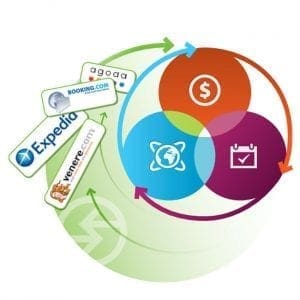 Data, information, facts Ð whatever you choose to call it Ð collecting and analysing it has become a crucial part of how we understand the world, taking us well beyond what our Ògut instinctsÓ were ever capable of. And as our ability to store and process large amounts of data has become faster, easier and cheaper, so too has our potential for insight. With this, individual businesses right through to entire industries are adopting business intelligence (BI) tools to take advantage of all the available information.
Data, information, facts Ð whatever you choose to call it Ð collecting and analysing it has become a crucial part of how we understand the world, taking us well beyond what our Ògut instinctsÓ were ever capable of. And as our ability to store and process large amounts of data has become faster, easier and cheaper, so too has our potential for insight. With this, individual businesses right through to entire industries are adopting business intelligence (BI) tools to take advantage of all the available information.
ÒIt is not the strongest species that survive, nor the most intelligent, but the ones most responsive to change.ÓÊÐ Charles Darwin
Darwin said it Ð the harsh reality is that the pace of change is ever-increasing and the organisations that do not adapt, will be left behind.
Fortunately, hotels already have the data Ð loads of it Ð but we often witness them fall into the trap of underestimating its true potential. They get caught up in the time, money and effort it is going to cost them to introduce new tools and processes, failing to recognise the return on investment that’s on offer.
The irony is, an effective BI tool is designed to make accessing and analysing this information simpler and less time-consuming. At its simplest, BI reduces the workload of producing reports by consolidating the plethora of data sources into an easy to digest format. At its finest, hotels can leverage big data to identify trends, derive insight and gain the necessary intelligence to respond to opportunities and improve decision making.
Take these examples of BI tools in action:
Manage Operations
A hotel has identified a correlation between checkout time and F&B spend. They discovered that by extending the checkout time from 10 a.m. to 12 p.m., guests were more likely to consume breakfast. Of course, this had the potential to create operational issues as the rooms still needed to be cleaned for arriving guests. This was overcome, again, by using data-driven insights to better manage the housekeeping function. The result was more F&B revenue plus efficiency gains in the housekeeping department.
Cause and effect
A hotel compares airline passenger information to diagnose the reason certain international markets appear to have slowed. There is sufficient granularity in the airline data to understand the correlation between arriving guests (at the destination) and the number of rooms sold in the hotel, to guests from a specific destination. Further examination of forward booking patterns highlighted a dip in passenger numbers, relative to the hotel’s diagnosis. Rather than devising a plan to ÒrecaptureÓ the loss, the hotel understands it is a market-related issue rather than a hotel issue and can plan accordingly.
Increase F&B
A hotel seeking to increase F&B revenue tries to identify the most profitable mix at a restaurant table (i.e. a couple, a family of four, a party of six, etc.). From the available data, specific groups of guests can be analysed based on spending patterns. One of the takeaways was the influence of alcohol consumption on the total food bill for certain groups, allowing staff to better manage with a table-by-table strategy.
Of course, there is no Òone-size-fits-allÓ hack to using your data; it is always going to depend on the hotel, the types of guests and the context. However, what these examples demonstrate is the potential to make better use of data to drive incremental improvements to revenue.
Whilst I will admit that I am forever preaching the word of hotel data, the facts are there. Data is facilitating faster and more accurate decision making, enhancing adaptive capabilities, fine tuning operations and fostering innovation. Yes, accessing, analysing and utilising this information takes time and resources but in a hyper-competitive market, that competitive advantage can be make or break.
Don’t chance the consequences of stubbornly sticking to old ways – stay ahead of the curve with BI.
About the author
 Georgia-Mae Smith works as Creative Coordinator atÊInTouch Data. The company provides CRM and BI applications to hotel chains and individual properties across the globe.ÊMoreover,Êthey work with industry vendors to provide data extraction, transform and load (ETL) services to streamline the data flow from numerous PMS. The company’s CRM application, dataArc, makes personalised pre-stay triggers a reality with forward booking data. Hotels can implement and execute an effective pre-stay marketing campaign and optimise the on-property experience with access to all its guest reservations and on-the-books information.ÊClick here for more details.
Georgia-Mae Smith works as Creative Coordinator atÊInTouch Data. The company provides CRM and BI applications to hotel chains and individual properties across the globe.ÊMoreover,Êthey work with industry vendors to provide data extraction, transform and load (ETL) services to streamline the data flow from numerous PMS. The company’s CRM application, dataArc, makes personalised pre-stay triggers a reality with forward booking data. Hotels can implement and execute an effective pre-stay marketing campaign and optimise the on-property experience with access to all its guest reservations and on-the-books information.ÊClick here for more details.















